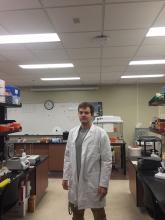I began a directed individual study course in Dr. Rhodes lab spring semester of 2016. I began by learning the basics of PCR and cloning. Once I was proficient enough to handle the basics, I was given a project to measure the biofilm capabilities of Flavobacterium johnsoniae, the main bacteria that we work with in Dr. Rhodes' lab. After working on that project for most of the semester, I was asked if I want to participate in the SURCA program over the summer. I was not going to pass up the opportunity and worked on a gene analysis study for F. johnsoniae. I continued this project through the end of the fall semester in 2017. I presented a poster at the North Carolina American Society of Microbiologists conference. This experience has made all the difference in my academic career.
I knew that I wanted to go to graduate school but, being the first in my family to pursue an academic career, I knew nothing about how to go about it. I emailed one of my professors and asked him for some advice on the topic. He pointed me to the DIS and Honors opportunities this school offered. I reached out to a few of the professors to enroll in a DIS and Dr. Rhodes' was the lab that I ended up in. My main hope from this experience was that it would help me get in to graduate school when the time came. I have no doubt that it has.
Learning basic lab techniques has helped me progress as a future scientist. It will give me hands on experience that I can take anywhere and utilize in any lab I may work in. There are a few challenges when it comes to scientific research. The two most important are precision and accuracy. Especially in a microbiology lab, both are key when all the reagents and resources used are pretty expensive. Mess up a few experiments and its like flushing money down the toilet. Preparation is key and knowing the mechanisms behind what you are doing goes a long way to help make the experiment a success.
The opportunity has given me the chance to make and present a poster at a regional conference where many PhD scientists attended. This puts me on their radar and lets me explain the work I have performed directly to future graduate mentors from other schools. Having a CSURF travel grant as well as a SURCA experience on my resume will make me a better candidate as it shows that I am capable of performing the work required to do the job of a graduate student.





